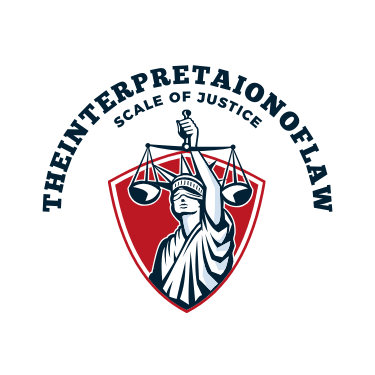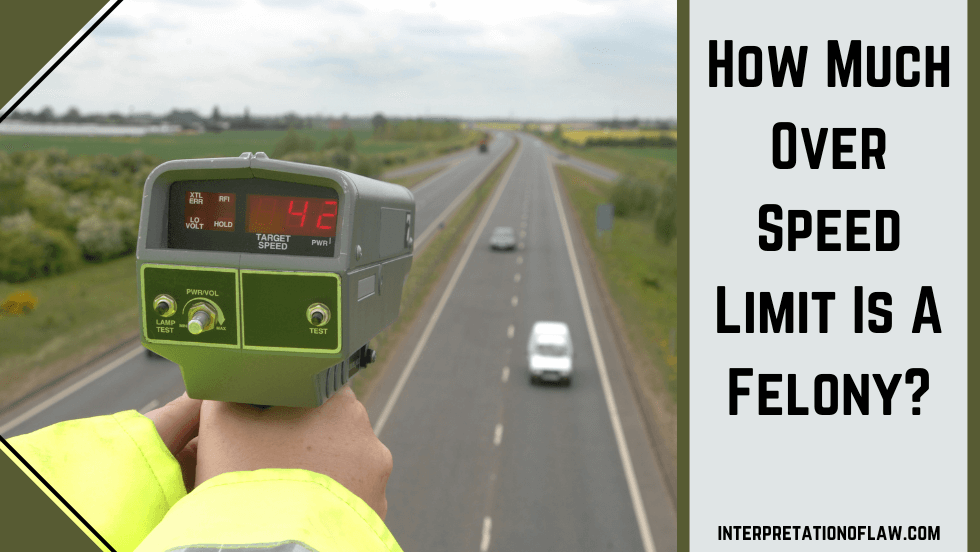Have you ever been pulled over and ticketed for exceeding the speed limit? Many drivers are unaware that depending on their speed, they could be charged with a felony. In many states, traveling over 100 miles per hour will get you charged with felony speeding. Although laws vary by state, exceeding the speed limit can have some serious consequences such as license suspension or even jail time.
This site interpretaionoflaw is here to provide more information on charges for exceeding the felony speed limits in the United States. It is important to understand what constitutes a felony speeding violation and what penalties may result if convicted of this type of crime in order to comply with local traffic laws. Furthermore, understanding your rights can help determine whether or not a driver is liable for any fines or other legal action taken against them.
Overview of United States Speeding Laws
Speeding laws across the United States vary from one state to another. Factors such as the type of road (interstate, urban or rural, and residential area), road conditions, and local regulations all come together to determine specific speed limit guidelines. Felony speeding typically applies when a driver exceeds the posted speed limit by a substantial margin—generally around 20 miles per hour (mph) or more. Some states even classify exceeding the speed limit by as low as 15 mph as felony speeding.
What is Felony Speeding in the US?
Felony speeding is a term used when a driver exceeds the speed limit by a enough amount, typically surpassing the threshold set by individual states. While all states have speed limits in place to maintain public safety, each state defines felony speeding differently based on the specific limits exceeded. It’s essential to be aware of these variations when driving across state lines to avoid the potential serious consequences of felony speeding violations.
Can you get a felony for speeding?
The answer isn’t always straightforward as it often depends on the state’s laws and individual circumstances. Generally, exceeding the speed limit by 30-40 miles per hour or more is considered a felony in most states, although this can vary. For example, in some states, driving over 90 mph is enough to constitute a felony speeding violation.
In addition to the excessive speed, other factors such as prior offenses, reckless driving, and the presence of minors in the vehicle can also contribute to a speeding violation being charged as a felony. It’s important to note that even if a driver is not charged with a felony, they may still face severe penalties for reckless driving or other dangerous behaviors on the road.
How much over the speed limit is a felony?
Speeding is a common traffic violation that many drivers commit, but how fast over the speed limit does one need to go before it becomes a felony? In most states, driving 20 miles above the posted speed limit is classified as a misdemeanor, which typically comes with a fine and points on your license.
How fast over the speed limit is a felony? if a driver exceeds 100 miles per hour or goes 30 miles above the speed limit, they can face felony charges. These charges can include hefty fines, community service, probation, and even jail time in some cases. It’s always important to obey traffic laws and drive safely, not only for your own well-being but also for those around you.
What is the punishment for speeding in the US?
Potential Consequences
Drivers who are guilty of felony speeding may face harsh penalties, including but not limited to:
- Hefty fines
- License suspension or revocation
- Mandatory traffic school or driving courses
- Increased insurance rates
In more severe cases, felony speeding can lead to imprisonment and a lasting impact on an individual’s criminal record.
Speeding Violation Penalties
Infraction speeding. Typically, a speeding violation is considered an infraction and entails fines that can vary from approximately $25 to $400. Moreover, in numerous states, a speeding ticket will lead to the allocation of points by the DMV to the driver’s record.
Typically, the precise fine amount is determined by the driver’s speed relative to the speed limit. For instance, certain states impose a base fine in addition to an incremental amount for each mile per hour exceeding the limit. In contrast, other states define specific fine amounts for various ranges of speed limit violations.
Many states also imposed higher fines for violations that occur in work or school zones.
Misdemeanor speeding. IIn certain states, speeding violations can escalate to misdemeanors under specific circumstances. These offenses may include prior violations or certain aggravating factors. For instance, in Illinois, driving 26 miles / hour or more above the speed limit can be considered a misdemeanor, potentially leading to a maximum of six months in jail and fines of up to $1,500. Similarly, in New Hampshire, exceeding 100 miles per hour is deemed a misdemeanor, resulting in a $500 fine and a 60-day license suspension. Stay cautious on the roads to avoid these consequences.
Felony speeding. Speeding violations may not always be charged as a felony, but under specific circumstances, things can take a serious turn. Imagine a driver racing down the streets or making a wild escape from the authorities – that’s when felony charges come into play. And if a speeding incident leads to injury or even worse, death, the driver could find themselves facing the daunting consequences of a felony charge. Safety on the roads should never be taken lightly.
Examples of Felony Speeding
Felony speeding offenses can range from first-time violations by inexperienced drivers to dangerous high-speed car chases involving repeat offenders. Some examples of felony speeding include:
A driver caught traveling at 85 mph in a 65 mph zone on a highway
A motorist involved in illegal street racing activities, resulting in speeds significantly higher than the posted limits
A repeat offender with a history of speeding violations, leading to more severe consequences with each new offense
What to do after Charged with Over Speeding?
If you have been charged with felony speeding, it is crucial to seek legal counsel quickly. A skilled attorney can assess your case and give guidance on the best course of action. They can also assist negotiate a plea bargain or represent you in court if necessary.
Additionally, it’s essential to prioritize safe driving practices and obey traffic laws to prevent future speeding incidents. Remember that exceeding the speed limit not only puts yourself at risk but also endangers the lives of others on the road. Let’s all strive to be responsible drivers and make our roads safer for everyone. Additionally, if a mistrial is declared in a case where felony speeding charges were involved, it does not automatically mean that the defendant will be released.
Depending on the circumstances of the case, the defendant may still be held in custody until a new trial date is set or bail can be posted. It’s necessary to consult with an attorney to understand the special laws and procedures in your state regarding mistrials and felony charges. So, always stay informed and up-to-date on traffic laws to avoid facing serious consequences such as felony speeding charges. Can you bond out on a felony charge? Learn more about bonding out on a felony charge and the legal implications.
Felony Speeding Prevention
To avoid experiencing the negative consequences associated with felony speeding, drivers should:
- Always know the speed limits for the area through which they’re driving, particularly when crossing state lines
- Regularly check their speed while driving to ensure compliance with the posted limits
- Utilize cruise control when feasible to maintain a consistent speed within the legal limits
- Plan trips and leave early enough to account for potential delays, reducing the temptation to speed to make up for lost time
By adhering to these guidelines and staying aware of local speeding laws, drivers can reduce the risk of facing costly fines, license suspension, or other substantial legal consequences.
FAQs
Is going over 100 mph a felony in Texas?
The penalties for speeding in Texas are determined based on the speed at which you were driving and the type of area in which you were driving. Generally, if you are caught exceeding the speed limit by more than 10% but less than 15 mph, you may face a fine of up to $200. However, if you are caught exceeding the speed limit by more than 15 mph, you may be charged with a misdemeanor and face fines of up to $500 or even potential jail time.
Can you go to jail for going 30 over the speed limit in Florida?
Upon being convicted of exceeding the speed limit by at least 30 MPH, a fine of $250 will be imposed. Should the offense occur in a school or work zone, the judge may double the fine. In the event of a reckless driving conviction, penalties include a possible jail term of up to 90 days and a fine ranging from $25 to $500.
Can you go to jail for over speed USA?
One could potentially face legal consequences, including being detained either on the roadside or after a court proceeding, if the speeding violation is accompanied by other offenses such as lack of insurance or driving with a suspended license. (Date: 05-Dec-2022)
Summary
Speeding violations can result in various consequences, depending on the state and circumstances. In some states, exceeding the speed limit by a certain amount can lead to misdemeanor charges and even jail time. In severe cases, felony charges may be imposed, resulting in much more significant penalties. It is crucial to prioritize safe driving practices and obey traffic laws to avoid facing serious consequences like felony speeding charges.
Seeking legal counsel immediately is recommended if charged with felony speeding, and staying informed about local laws can help prevent future incidents. Remember, being a responsible driver not only protects yourself but also those around you on the road.
Let’s all do our part in making our roads safer for everyone. So, always prioritize safety and follow traffic laws to avoid facing severe penalties and potential jail time. Stay informed, stay safe. Keep our roads free from felony speeding! So, let’s all strive to be responsible drivers and make our roads safer for everyone. Safety first, always!
Disclaimer
This document is for informational purposes only and should not be considered legal advice. If you have been charged with a speeding violation or any other offense, it is essential to seek the guidance of a qualified attorney.
Laws and penalties may vary by state and individual circumstances, so please consult with a legal professional for specific advice related to your case. Stay informed and stay safe on the roads. Let’s all work together to reduce the number of speeding incidents and make our roads safer for everyone.
Remember, safety first, always! Speeding is not worth the potential consequences, so let’s all strive to be responsible drivers. Here’s to safe and responsible driving for all! So, let’s make a conscious effort to obey traffic laws and prioritize safety on the road. Together, we can prevent unnecessary accidents and ensure that everyone arrives at their destination safely. Let’s keep our roads free from felony speeding.
So, remember to always drive with caution and follow the speed limits. Let’s all do our part in creating a safer driving environment for everyone. Stay informed, stay safe, and be responsible on the road.
References:
- https://www.justice.gov/criminal/resource/18-usc-section-3559
- https://www.drivinglaws.org/resources/traffic-tickets/speed-violations/texas-speeding-laws.htm
- https://www.dmvflorida.org/florida-traffic-laws/
- https://www.drive-safely.net/felony-speeding/
- http://blogs.findlaw.com/blotter/2013/07/top-5-penalties-for-speeding-tickets.html So, always stay informed and up-to-date on traffic laws to avoid facing serious consequences such as felony speeding charges. Remember, safety first, always.

Carter Wilson is a licensed lawyer with over 10 years of experience in various legal fields. He is passionate about making law accessible to the general public and helping individuals navigate through complex legal matters.

